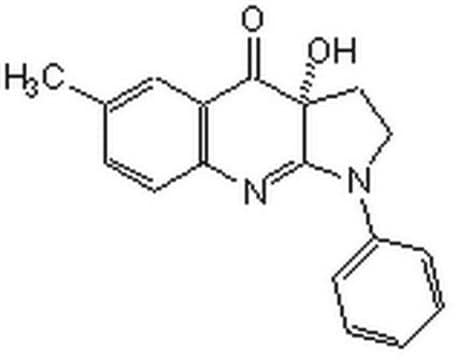203391
(-)-Blebbistatin
≥98% (HPLC), solid, ATPase inhibitor, Calbiochem®
Sinónimos:
(-)-Blebbistatin
About This Item
Productos recomendados
product name
(-)-Blebbistatin, The active enantiomer of (±)-Blebbistatin that accounts for the inhibitory activity towards ATPase and myosin II-dependent cellular processes.
Quality Level
assay
≥98% (HPLC)
form
solid
potency
2 μM IC50
manufacturer/tradename
Calbiochem®
storage condition
OK to freeze
protect from light
color
yellow
solubility
methanol: 1.5 mg/mL
100% DMSO: 100 mg/mL
90% DMSO: 75 mg/mL
shipped in
wet ice
storage temp.
−20°C
InChI
1S/C18H16N2O2/c1-12-7-8-15-14(11-12)16(21)18(22)9-10-20(17(18)19-15)13-5-3-2-4-6-13/h2-8,11,22H,9-10H2,1H3/t18-/m1/s1
InChI key
LZAXPYOBKSJSEX-GOSISDBHSA-N
General description
Biochem/physiol Actions
Packaging
Warning
Reconstitution
Other Notes
Shu, S., et al. 2005. Proc. Natl. Acad. Sci. USA102, 1472.
Kovacs, M., et al. 2004. J. Biol. Chem.279, 35557.
Straight, A.F., et al. 2003. Science299, 1743.
Legal Information
Storage Class
11 - Combustible Solids
wgk_germany
WGK 3
Certificados de análisis (COA)
Busque Certificados de análisis (COA) introduciendo el número de lote del producto. Los números de lote se encuentran en la etiqueta del producto después de las palabras «Lot» o «Batch»
¿Ya tiene este producto?
Encuentre la documentación para los productos que ha comprado recientemente en la Biblioteca de documentos.
Nuestro equipo de científicos tiene experiencia en todas las áreas de investigación: Ciencias de la vida, Ciencia de los materiales, Síntesis química, Cromatografía, Analítica y muchas otras.
Póngase en contacto con el Servicio técnico








